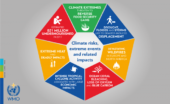Re Ian Bremmer 'Could third-party candidates upend the 2024 US election?' 3 April The current political movement in the USA…
Wednesday Night #1317
Written by Diana Thebaud Nicholson // May 30, 2007 // Agriculture & Food, Business, Environment & Energy, Herb Bercovitz, Reports, Water, Wednesday Nights // 2 Comments
May 30, 2007
After three weeks of stimulating and highly informative environment and energy (including nuclear) focus, we return to other thoughts.
We are suffering from election blues and that’s not a reference to any political preference.
At this writing, we have no idea how the deal-cutting between Premier Charest and the PQ is working out, but it does appear a bizarre negotiation. It’s too bad our Premier insists on the tax cut which even the electorate doesn’t seem to want. At least, according to the Léger Marketing poll, which found 56 per cent of Quebeckers don’t want the Liberal minority government to be defeated over the budget, but seven out of 10 people questioned said they don’t want Charest’s promised income tax cuts.
That’s 70% in our math, which is not the Reform Math exposed by CBS [read and weep!]
Will the Lieutenant Governor (whichever one – that’s another story) get us out of this mess and in to the simmering frying pan of a Mario Dumont government?
Meanwhile, Judge Grenier will release his report tomorrow (Tuesday) about the allegations that Option Canada secretly channeled almost $5 million in federal cash to help the No campaign. It is expected to lay blame on a number of people, including key provincial Liberals. Jean Charest must be wishing that he had chosen another career.
We are feeling very grumpy about government in general, although we do recognize that we should be happy that we live in a society where we are allowed to articulate this emotion, and not be shot, disappeared, or blown up. All that can happen to us is that we will be put on the Enemies List , audited, ignored, and/or become or remain unsubsidized.
Let us rejoice that we are not citizens of Nigeria wondering what happens now that Umaru Yar’Adua succeeds Olusegun Obasanjo in that country’s first “democratic” handover – let us not quibble over the election process and let us hope that Mr. Yar’Adua keeps to his promise of electoral reforms, but, we agree with the BBC that it would be really nice if he did something about cleaning up the corruption. Which brings us to an interesting piece in IPS News about the African countries that are blessed/cursed with natural resources wealth: “Oil and other mineral resources have led to conflict and corruption in countries like Sierra Leone (diamonds), Nigeria (oil), Equatorial Guinea (oil), the Democratic Republic of the Congo (diamonds, timber, rare fauna), Gabon (oil) and Angola (oil)”. Seems that only The Emirates are capable of understanding that oil is a finite resource; Bahrain and Dubai are doing a great job of long-term planning and diversification.
More election news and upheavals in Israel as Amir Peretz has been ousted as Labour party leader; which will doubtless lead to more uncertainties, with the possibility of new elections should Prime Minister Ehud Olmert fail to put together another coalition.The one good piece of international news we have identified is that the U.S.-Iran talks on Iraq’s security seem to have borne some fruit, despite the unfortunate reminder that all was not serene when, at the end of the meeting, a truck bomb exploded outside one of Baghdad’s most revered shrines, killing at least 19 people and damaging the Abdel Qadir Gilani mosque.
Financial good news from China where the stock market broke 4,000. Consider this: “More than 300,000 people a day opened brokerage accounts last week. As the country’s wealth grows, everyone from students and farmers to business people and pensioners are choosing to put their savings into the stock market rather than bank accounts.” But of course this fuels worries about a bubble.
However, the story we like most this week is Forbes’ fascinating “Ten People Who Could Change The World ” and one of them is McGill neuroscientist Karim Nader. This story has so many ingredients of previous – and no doubt future – Wednesday Night discussions that we are sure that we will come back to it on many evenings.
The Report
John Curtin was congratulated on winning two Golden Sheaf awards at the 60th annual Yorkton Short Film and Video Festival last month for his wonderful documentary on Terry Mosher (Aislin) : Dangerous When Provoked.
His next undertaking is a production for CTV, “To Hell with Manners: the decline of civility”. It is profoundly hoped that he will not select Wednesday Night as an illustration.
Foreign acquisition of resource companies
A short clip was played of Michael Enwright’s interview with Andrea Mandel-Campbell, author of Why Mexicans Don’t Drink Molson, which generated discussion of the timidity/conservative approach of Canadian investors. Canadians tend to be cautious and conservative when buying, but want top dollar when they sell. We have been investing in foreign countries for years, but now that our resource companies, and corporations such as the quintessentially Canadian Hudson Bay Company are foreign owned, a red flag has gone up.
In the fear and discussion over this issue we appear to be ignoring a more vital threat to our national continued existence, namely water, our most precious resource in great demand and currently in plentiful supply. Canada has 7% of the world’s renewable supply of freshwater and 20% of the world’s total freshwater resources (including waters captured in glaciers and the polar ice cap).
[We should be mindful that only 1% of the world’s water is usable as about 97% is sea (salt) water, and 2% is frozen in glaciers and polar ice caps.]
Some Wednesday Nighters believe that the water issue will ultimately bring us into conflict with our southern neighbours. If this scenario is accurate, we cannot possibly win, and would undoubtedly lose our national identity along with our most vital resource.
The rising dollar
An interesting sidelight has been the increasing value placed on the Canadian dollar, undoubtedly linked to increasing foreign acquisition of Canadian companies in Canadian currency. This increase in price, but not value, of our currency has affected our exports, thus having a negative effect on our economy. Former Wednesday Nighter, Stephen Poloz, Vice President of the Export Development Corporation believes that, while “the prices of natural gas, copper, nickel and agricultural goods have also risen significantly in the past six months, adding 1-2 cents to the dollar’s intrinsic value…the bigger reason has to do with expectations of global monetary policies” and concludes that ” The loonie is looking for a comfortable nest in a familiar neighbourhood. A forward view of the fundamentals, including declines in a number of commodity prices, suggests that it will land somewhere around 83-84 cents later this year.” See
The stock market
The stock market has been on a long, positive, bull run, yielding impressive rewards to investors, inevitably raising the question of the value of financial advisors, gurus and mutual funds, each claiming a reward for their expertise. While some claim that investing in index funds in the present market is more financially rewarding than working with an advisor or mutual funds; others, who follow the thinking of Jeremy Siegel point out that investing in solid companies with good management and reinvesting the dividends, is the way to go in the longer term. The bull market will inevitably reach its apex in the near future and revisiting this discussion will be interesting.
Québec election?
During his term-and-a-bit in office, Jean Charest has inexplicably squandered much of the good will he had when first elected by playing the role of politician rather than that of statesman. Now, faced with the prospect of another election, rather than making acceptable compromises with the parties in opposition, he appears to be playing chicken with them. It is clear that the population of Québec does not want a second election in the space of less than a year and if the Liberal Party cannot bring itself to compromise with the opposition, the Lieutenant Governor should follow the lead of Ontario in a comparable situation with Peterson’s Liberals and Bob Rae’s NDP, and name Mario Dumont Premier while extracting a commitment from all parties to refrain from an election for a period of eighteen months to two years. While avoiding a costly election, the second within a year, this would also serve the purpose of providing a reasonably stable government while enabling the three parties to replenish their coffers. The Liberals could profit by transforming some of their arrogance into statesmanship, the Parti Québécois would be able to test the strength of its own new leader and the weaknesses of both the leadership and the rank and file of the ADQ, and Mario Dumont would have the opportunity to test his mettle in the National Assembly arena.
Canada, Kyoto and sustainable consumption
The visit of Governor Schwarzenegger to Canada has generated considerable interest, is regarded as having been productive (not to mention a sharp contrast with Canada’s leadership) , given his enthusiastic leadership on environmental issues and his attitude that “it’s possible to take care of our economy at the same time we take care of our planet”. This attitude was greeted with some scepticism by some Wednesday Nighters, but ardently championed by others.
The Governor’s visit to BC also generated discussion of the Hydrogen Highway planned for the 2010 Olympics
With more evasion than leadership from our federal government, it is virtually certain that our commitments to the Kyoto Protocol will not be met because there are not the carbon-reducing technologies with which to do so. Canada has fallen behind the world, in part perhaps, because we speak of cost rather than investment in becoming more energy efficient. Certainly motor vehicles and farm equipment are more costly than horses, and mechanized equipment more efficient than hand labour, but had the Luddites prevailed, it is doubtful that society could have reached its current level of sophistication. It has been reported that Alberta oil and gas companies are currently supporting Kyoto as the world reacts to Canada’s apparent indifference. We could go back to consuming only local production of food and produce in order to reduce fuel consumption but that would result in inbreeding and protectionism, a retrograde step.
To date, the most realistic solution is nuclear energy released by fast breeder reactors. Unfortunately this initiative would take up to twenty years to develop. However if the past is any indication, the development phase is infectious and new technologies appear and are developed in a parallel fashion, the most efficient normally winning the race until it, too, is superseded by another generation of technology. There are currently twenty-eight nuclear plants being built in twelve countries, a figure that is miniscule in comparison to the 850 coal-fired plants due to come online in China, India and the United States by 2012
· What is the fine if Canada doesn’t making Kyoto targets, what are the consequences internationally and what is the monetary cost?
· It’s not the environment at the cost of the economy – it’s an opportunity
Our favorite commentator, Rex Murphy , gave a rousing conclusion to the discussion with a particularly vigorous rant on carbon emission certificates.
*************************************




2 Comments on "Wednesday Night #1317"
31 May 2007
How business is starting to tackle climate change, and how governments need to help
… Until recently business tended to take a dim view of the idea that the climate was changing. The notion implied that industry had damaged the planet, and should therefore pay for the consequences. Since companies couldn’t see the damage they were supposed to have done, they preferred, by and large, to argue that it wasn’t happening.
No longer….
Cleaner energy means new technologies, and new money to be made. Businesspeople … need to invest in technologies that will produce cleaner energy…. Global investment in renewable power-generation, biofuels and low-carbon technologies rose from $28 billion in 2004 to $71 billion in 2006, according to New Energy Finance, a research company. The stock prices of clean-energy companies have been rocketing up. Silicon Valley’s venture capitalists are piling into the business, convinced that they can design revolutionary technologies, bring down prices and turf out incumbents in the energy business just as they did in the software business. Oil firms, carmakers, power generators, nervous of being outmanoeuvred, are jacking up their investments in renewables and biofuels….
3 June 2007
David and Diana:
Someone at the last Wednesday Night referred to buying locally. Apparently, carbon emissions are not straight forward based on mileage. Regards, Doug (Lightfoot)
Greener by miles
Conscientious consumers are being urged to buy locally sourced food in the battle against climate change. But, … produce from the other side of the world can actually have a smaller carbon footprint complete article